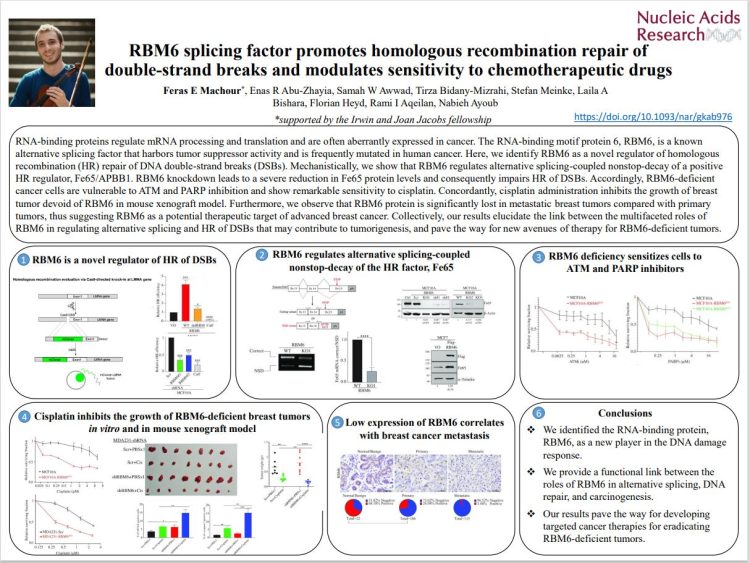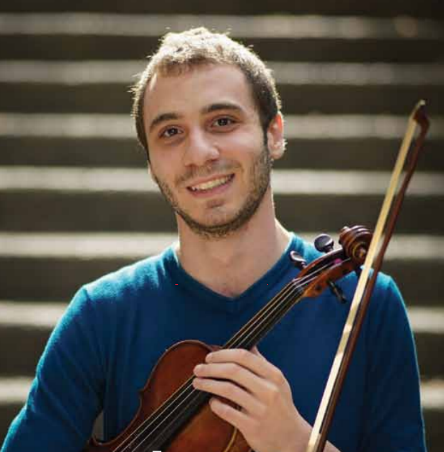SPOTLIGHT ON RESEARCH
PAPER OF THE MONTH OCTOBER 21
The Committee for Graduate Studies in the Faculty of Biology selects each month the leading scientific article from all the scientific articles published for that month.
We are pleased to announce that the winner of this October’s article is the doctoral student Feras Machour from Prof. Ayoub Nabieh laboratory, whose article was published in Nucleic Acids Research. On the occasion of the win, we asked Feras to provide us with some interesting details about the study, the path that led to the research it and also a bit about himself.
Hi, could you introduce yourself in a few words?
I am Feras, 25 years old, finished my BSc in Biochemical Engineering, and am currently a Ph.D. student at Prof. Nabieh Ayoub’s lab.
Could you explain what Prof. AYOUB laboratory is about?
The lab investigates the cellular response to DNA damage and its link to cancer. The DNA in our cells is continuously attacked by a variety of factors, such as UV radiation. To cope with the massive amounts of DNA damage, cells evolved complex and intricate mechanisms to repair broken DNA and prevent the accumulation of mutations. The lab investigates these repair mechanisms to better understand how cells deal with DNA damage and to exploit these mechanisms to develop targeted cancer therapies.
Could you tell us about your current article/research, what was the main purpose of the research and what did you discover?
Our article focuses on the RNA-binding protein, RBM6. A long-standing question in the field of DNA damage response is whether RNA-binding proteins are involved in this process and what are the molecular mechanism underlying their involvement. In this research, we identified a previously unrecognized role of RBM6 in promoting homology-directed repair of DNA double-strand breaks (extremely toxic DNA lesions) that prevents deleterious mutations. In addition, we discovered the molecular mechanisms by which RBM6 promotes double-strand break repair. Importantly, we exploited our findings for selective eradication of RBM6-deficient tumors in mice.

Can you elaborate on the importance of the discovery? Why will this discovery serve you and what directions does it take? What is the application of the discovery (domains, solutions)?
Our findings regarding the involvement of RBM6 in the DNA damage response raise the possibility that other RNA-binding proteins might be involved in this process. Importantly, RBM6 and other RNA-binding proteins are heavily mutated in cancer. Therefore, identifying innovative ways to target these mutations, such as targeting the DNA damage response, can lead to the development of new and personalized cancer therapies.
What drew you to the current lab/project?
I did my bachelor’s degree in biochemical engineering, but I quickly realized that engaging in basic research interests me more than working in the chemical engineering industry. During my undergraduate degree, I talked to Prof. Nabieh Ayoub about his field of research and it interested me greatly and I started a research project in the lab and from there I moved on to a master’s degree and a Ph.D. The research in the Ayoub lab is fascinating as it combines basic molecular research of the DNA damage repair process with applicative research focused on developing novel targeted cancer therapies.
When you are not “doing” science, what do you do?
I practice playing the violin and perform in concerts. In addition, I try to spend as much time as possible with my family
When you grow up what do you want to be?
A video game developer
what are your plans for the future of your career?
I plan to do a post-doc in an interesting research field and pursue a career in scientific research to discover and develop innovative ways to treat human disease.
A link to the full article: https://academic.oup.com/nar/advance-article/doi/10.1093/nar/gkab976/6413602
A link to ayoub lab site: https://ayoubn.net.technion.ac.il/
To Prof. Ayoub page: https://biology.technion.ac.il/en/member/ayoub/








